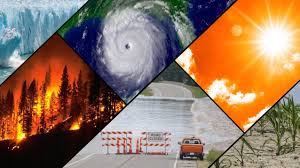- According to the Indian Meteorological Department (IMD), heatwave conditions hit either smaller regions or bigger geographical areas in India on the 26th of the month.
What are Heat Waves?
- The “World Meteorological Organisation” defines a heat wave as five or more consecutive days in which the daily maximum temperature is five degrees Celsius higher than the average maximum temperature.
- A heat wave occurs when the highest temperature in a certain location exceeds 45 degrees Celsius for two consecutive days.
Impact of Heatwaves:
- Impact on Resource Availability:
- Water Resources: It exacerbates water shortages by causing water bodies to dry up, decreasing water availability for agricultural and residential use, and increasing resource competition. This can lead to water-related disputes, change irrigation methods, and have an impact on water-dependent sectors.
- Energy Resources: It raises electricity demand for cooling, putting a pressure on power networks and perhaps causing blackouts. This can interrupt economic activity, reduce productivity, and hurt vulnerable people.
- Impact on Health:
- Prolonged heat exposure can cause dehydration, as well as cardiovascular and respiratory illnesses.
- Rapid increases in heat gain can impair the body’s capacity to regulate temperature, resulting in a series of disorders such as heat cramps, heat exhaustion, heatstroke, and hyperthermia.
- The Health Ministry recorded 264 heat-related fatalities in the first six months of 2023. The NCRB recorded 730 heat-related fatalities in the same year.
However, data gathered and maintained by the IMD and NDMA (National Disaster Management Authority) show a significant decrease in heat-related mortality since state governments and district administrations implemented heat action plans.
To mitigate heatwaves
- Build an early warning system. The Inter-Agency Coordination must notify citizens of projected high and severe temperatures. Individuals and units of essential departments are informed of who will do what, when, and how, particularly in the health sector.
- Improve Public Awareness and Community Outreach: Distributing public awareness messages about how to safeguard against the excessive heat wave using social media and commercials. Furthermore, the government should educate the general people about the Do’s and Don’ts of heat-related diseases via television programmes.
Conclusion:
Improve engagement with non-governmental and civil society organisations to improve public spaces as needed, improve water distribution systems in public locations, and implement other creative strategies to combat heatwave conditions.
Source: https://indianexpress.com/article/explained/explained-climate/explained-climate-heatwaves-climate-change-9329251/#:~:text=A%20new%20study%20has%20attributed,and%20intense%20in%20the%20country.&text=The%20extreme%20heat%20in%20parts,been%20attributed%20to%20climate%20change.

